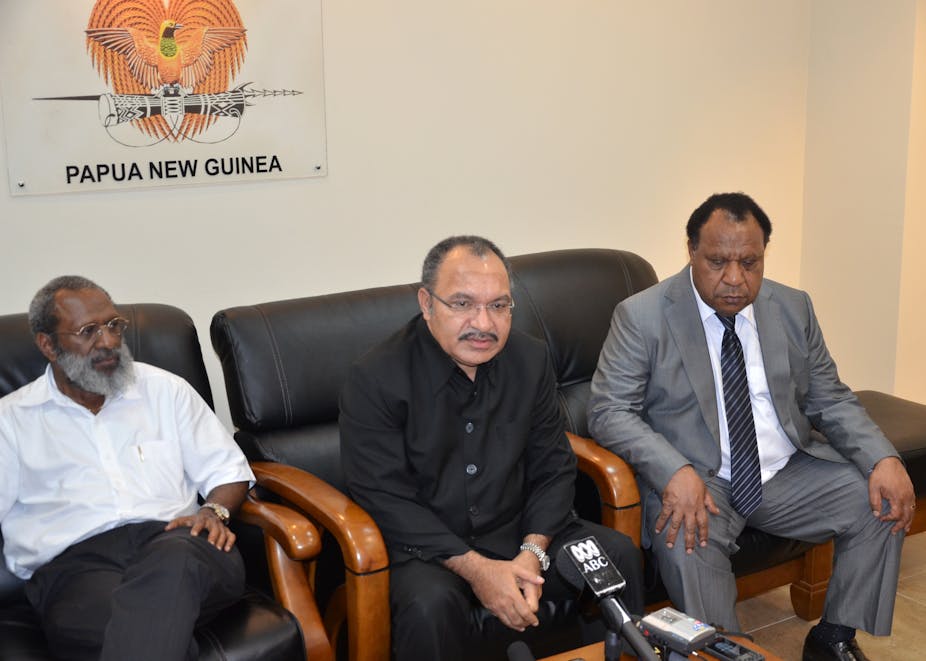At first glance, the deal between prime ministers Kevin Rudd and Peter O’Neill transferring all Australian-bound asylum seekers to Papua New Guinea appears to deliver many benefits to that small poor country.
In return for housing the boat-arriving asylum seekers and resettling those found to be refugees, PNG receives a package of much-needed assistance, that includes redeveloping its universities, a new hospital, upgrading roads, a new courts complex, and the deployment of Australian police.
In addition, the processing centre on Manus Island will be expanded, PNG’s naval facilities on the island will receive a facelift, and schools and health centres will be constructed for Manus Islanders.
But despite these advantages, opposition to the deal has been increasingly strident, with the PNG opposition centring on what one commentator has called Australia’s “neo-colonialism”.
Legal challenges will undoubtedly arise and the deal’s future will be ultimately decided in both Australia’s and Papua New Guinea’s highest courts.
Is the deal just another iteration of the long-term relationship between our two countries? Has PNG been put over a barrel, as many critics are suggesting, and forced to help the Rudd government out of a fix, bribed by promises of development that it desperately needs?
A changing relationship
Kevin Rudd first visited the Pacific nation as prime minister in March 2008. With then-prime minister Michael Somare, he signed the Port Moresby Declaration.
This document represented a recasting of Australia’s aid relationship with its former territory and, later, with the Pacific region as a whole.
It introduced the concept of “Pacific Partnerships for Development”, in which Australia provides increased aid in return for the commitment by Papua New Guinea (and later, other island nations) to lift its own contribution to improving governance, economic infrastructure, health and education.
It affirmed that Papua New Guinea had graduated to a more mature national status as an equal partner in its own development.
Recognition of the country’s fundamental equality with Australia as a sovereign nation departs from the previous century and a half of our shared history, when “master-servant” more accurately reflected the relationship.
From first contacts in the mid-19th century and throughout the colonial era in the 20th (up to and after independence in 1975), Australia’s governments have subsidised development in the country.
Australia has been a generous donor, contributing hundreds of millions of dollars each year since 1975, initially in direct budgetary support, then tied-project aid, and now more program-related assistance.
But reviews of its aid program over the last two decades have done little to alter the perception that the relationship remained one of donor-recipient.
The Port Moresby Declaration represented movement away from this unequal relationship, properly recognising the rights of both partners to equal respect as sovereign and democratic nations.
The Declaration embraces this concept, simultaneously requiring both parties to use the assistance responsibly. Answering the criticism of aid dependency that it leads to abnegation of responsibility for development by the recipient, the concept of partnership recognises that Papua New Guinea needs to be a contributor to its own improvement.
In particular, it seeks to lift the country’s performance if it wishes to continue to collaborate with Australia.
Respecting sovereignty
There has been, and continues to be, close attention paid to the effectiveness of Australian (and other) aid, in alignment with the tenets set out in the Declaration (and the Joint Declaration by the two countries, agreed in May 2013).
How Australia’s development assistance – more than $500 million in 2012-13 – is spent is a crucial part of our relationship. The potential addition of untold millions of dollars in infrastructure, law and order, health and education investment, tied to the immigration deal, will need to be (and no doubt, will be) subject to detailed scrutiny.
What matters, though, is that this arrangement is one freely entered into by the leaders of both nations. Both Australia and Papua New Guinea are constitutional democracies where the rule of law is respected, and where the electorate has the right to remove from office governments they do not like.
In Australia, the deal might be a way for the Rudd government to persuade the Australian people that it has an answer to this seemingly intractable problem (or it might not – we shall see).
In Papua New Guinea, there are democratic ways for government decisions to be reviewed; even there the ballot box awaits (albeit not for a few years following last year’s national election). Dealing with Papua New Guinea as a sovereign partner requires the assumption that it, and not Australia, is master of its own destiny.
A final word for the people at the centre of all this: the people who arrive by boat without a visa. After their storm-tossed passage across the Indian Ocean, they are being tossed on the metaphorical storm of domestic politics in Australia and Papua New Guinea, regardless of the fact that their status demands compassion.
There are many in Australia who would welcome them, and there is little doubt that there are many Papua New Guineans who will make them, and their potential to contribute to the country, equally appreciated.

